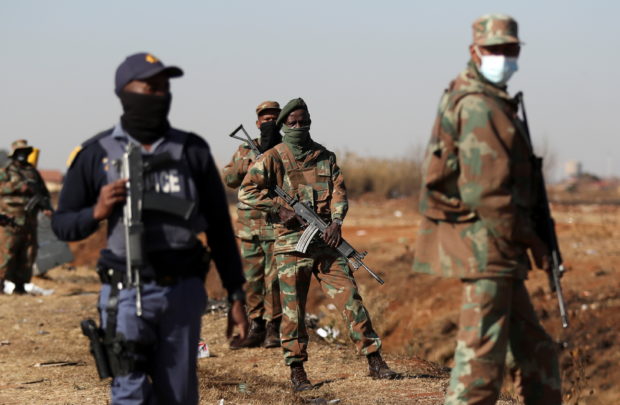
Security personnel patrols near protesters as the country deploys army to quell unrest linked to the jailing of former South African President Jacob Zuma, in Vosloorus, South Africa, July 14, 2021. (REUTERS)
DURBAN, South Africa – South Africa plans to deploy up to 25,000 soldiers in two provinces where security forces are struggling to quell days of looting, arson and violence, its defence minister told a parliamentary committee on Wednesday, according to local news channel eNCA.
A military surge of that size would increase tenfold the number of soldiers deployed in the hot spots of KwaZulu-Natal and Gauteng provinces, where the police and army have been battling unrest for days.
“We have now submitted a request for deployment of (about) 25,000 members,” according to a video recording of Defence and Military Veterans’ Minister Nosiviwe Mapisa-Nqakula shown on eNCA.
Triggered by the jailing of ex-president Jacob Zuma last week, after he failed to appear at a corruption inquiry, protests have widened into an orgy of looting and an outpouring of anger over the hardship and inequality that persist in South Africa 27 years after the end of apartheid.
More than 70 people have been killed in the unrest, the worst in South Africa for years, and hundreds of businesses wrecked. Food and fuel supplies are running short.
Shopping malls and warehouses have been ransacked or set ablaze in several cities, mostly in Zuma’s home in the KwaZulu-Natal province, especially the Indian Ocean port city of Durban, and the financial and economic centre Johannesburg and surrounding Gauteng province.
But in signs of a public backlash, residents in some areas on Wednesday turned suspected looters into police, blocked entrances to malls and in some cases armed themselves as vigilantes to form road blocks or scare them away.
In Vosloorus, southern Johannesburg, minibus taxi operators, many of whom have guns, fired bullets into the air to scare off looters.
“We can’t just allow people from nowhere to come and loot here,” said Paul Magolego, Vosloorus taxi association spokesperson, adding that taxi drivers had had no business since Monday because of the unrest.
Underscoring the inherent dangers in such vigilantism, a 15-year-old boy was killed by a stray bullet in Vosloorus, according to a Reuters photographer who saw the body. Magolego said the taxi owners arrived on the scene after he was dead.
In Alexandra township in northern Johannesburg, one of the city’s poorest neighbourhoods, a Reuters correspondent saw soldiers moving door-to-door to confiscate stolen items, with the help of civilians opposed to the looting.
Citizens armed with guns, many from South Africa’s white minority, blocked off streets to prevent further plundering, in Durban, Reuters TV footage showed.
Others were forming online groups to help clean up and rebuild devastated neighbourhoods.
‘WE HAVE NOTHING’
Security forces say they have arrested more than 1,200 people, while President Cyril Ramaphosa met political party leaders on Wednesday to discuss the unrest.
The violence appeared to have abated in some areas, but in others, there was renewed burning and looting.
Some rich Durban residents chartered small planes and helicopters out of the city, a Reuters photographer reported.
Though triggered by Zuma’s imprisonment, the unrest reflects growing frustration at failures by the ruling African National Congress to address inequality decades after the end of white minority rule in 1994 ushered in democracy.
“It’s not about Zuma, it’s about poverty,” a man who gave his name as Elijah said, as soldiers confiscated stolen items from his house in Alexandra.
“I grabbed things I could take like those cold drinks and some paint. I guess the real reason is because we actually have nothing.”
Half the population lives below the poverty line, according to the latest government figures from 2015, and growing joblessness since the coronavirus pandemic began has left many desperate. Unemployment stood at a new record high of 32.6% in the first three months of 2021.
The unrest also disrupted hospitals struggling to cope with a third wave of COVID-19.
The National Hospital Network (NHN), representing 241 public hospitals already under strain from Africa’s worst COVID-19 epidemic, said it was running out of oxygen and drugs, most of which are imported through Durban, as well as food.
The mayor of Ethekwini, a municipality that includes Durban, estimated that 15 billion rand ($1 billion) had been lost in damage to property and another billion in loss of stock.
“I appeal to the Zulu nation to withdraw from the participation in the destruction of our country,” The Zulu King Misuzulu said in an address – many of the affected areas are predominantly Zulu, the nation to which Jacob Zuma belongs.
Zuma, 79, was sentenced last month for defying a court order to give evidence at an inquiry investigating high-level looting during his nine years in office until 2018.
He has pleaded not guilty in a separate case on charges including corruption, fraud, racketeering and money laundering.